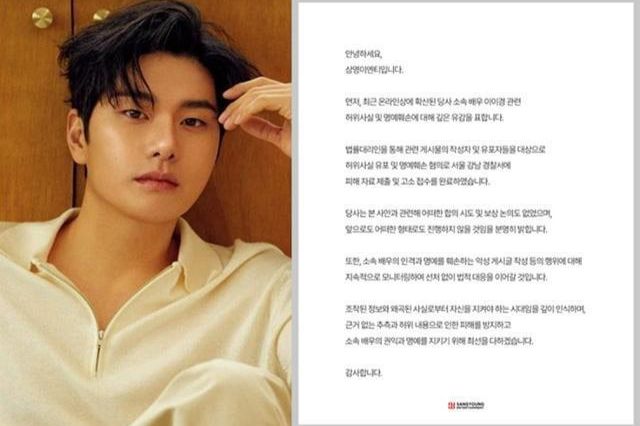Listen to the article
South Korean authorities are investigating a case of AI-generated defamation after actor Lee Yi-kyung’s agency filed formal criminal complaints against individuals who spread false rumors about the performer online.
Sangyoung ENT, which represents the popular actor, announced Monday that it had submitted evidence to Seoul Gangnam Police Station accusing at least one person of defamation and disseminating fabricated information that damaged Lee’s reputation.
“We express deep regret over the situation,” the agency said in its statement. “Through our legal representatives, we have filed complaints against those responsible for posting and circulating false claims.”
The agency emphasized its zero-tolerance approach, stating there have been no settlement discussions or compensation attempts, “nor will there be any going forward.” This strong stance signals the agency’s determination to pursue the case through legal channels rather than seeking private resolution.
The controversy erupted when an anonymous social media user claimed Lee had requested explicit photographs and made inappropriate comments during private conversations. These allegations quickly gained traction online, causing significant damage to the actor’s public image before being revealed as fraudulent.
After the agency’s firm denial of the accusations, the original poster admitted to generating the fake conversation using artificial intelligence technology. The individual characterized the fabrication as a “prank” that spiraled out of control and issued a public apology.
However, despite the accuser’s retraction, the false information continued to circulate across social media platforms, subjecting Lee to ongoing harassment and reputational damage. This persistence of misinformation, even after being debunked, illustrates the challenging nature of containing digital falsehoods in today’s interconnected online environment.
The case highlights growing concerns about the misuse of AI technology to create convincing but entirely fabricated content that can severely damage public figures’ reputations. As AI-powered tools become increasingly accessible to the general public, entertainment industries worldwide are grappling with how to protect talent from sophisticated digital impersonation and defamation.
South Korea’s entertainment industry has been particularly vigilant about online defamation, with agencies increasingly taking legal action against malicious commenters. The country’s defamation laws allow for criminal prosecution, with penalties that can include imprisonment and substantial fines, especially when false information is deliberately spread to damage someone’s reputation.
“We will keep monitoring and pursue legal measures without leniency against anyone who damages our artist’s reputation or dignity through malicious online activity,” Sangyoung ENT warned in its statement. “We will do everything possible to defend our actor’s rights and reputation against baseless rumors.”
The agency added that it has begun a comprehensive assessment of the damages incurred and intends to hold all parties involved in spreading the misinformation accountable through legal proceedings.
This incident comes amid increasing calls in South Korea for stronger regulations regarding AI-generated content and digital impersonation. Entertainment companies, concerned about protecting their investments in talent, have been particularly vocal about strengthening legal protections against such abuses.
Lee Yi-kyung, who gained prominence through roles in various popular Korean dramas, has not personally commented on the situation. His agency’s decisive response, however, sends a clear message about the seriousness with which they view digital defamation in an era where false information can spread globally within hours.
The case remains under investigation by Seoul authorities, who will determine whether to pursue formal charges against the individuals responsible for creating and disseminating the fabricated content.
Verify This Yourself
Use these professional tools to fact-check and investigate claims independently
Reverse Image Search
Check if this image has been used elsewhere or in different contexts
Ask Our AI About This Claim
Get instant answers with web-powered AI analysis
Related Fact-Checks
See what other fact-checkers have said about similar claims
Want More Verification Tools?
Access our full suite of professional disinformation monitoring and investigation tools




8 Comments
Disturbing to see AI being used to create false rumors about a public figure. I’m glad the agency is taking a strong stance and pursuing legal action. Disinformation campaigns like this need to be stopped.
This is a concerning trend of AI-generated defamation targeting individuals. I hope the investigation leads to the responsible parties being held accountable. Spreading fabricated information online can have serious consequences.
Absolutely. The agency is right to pursue this aggressively through legal channels. Allowing these kinds of false claims to go unchallenged only emboldens those who would misuse technology for malicious purposes.
The details here are quite disturbing. Using AI to generate defamatory content is a new low. I hope the authorities are able to identify and hold the responsible parties accountable.
Agreed. AI-powered disinformation campaigns pose a real threat that needs to be addressed. Kudos to the agency for taking swift legal action to defend their client.
It’s good to see the agency taking a firm stance against these false rumors. Protecting the reputations of public figures is important, especially when malicious actors try to use technology to spread lies.
This is a concerning case of false online rumors targeting an actor. I’m glad the agency is taking strong legal action to protect the performer’s reputation. Spreading fabricated information online can cause real harm and should be taken seriously.
Absolutely. The agency’s zero-tolerance stance is the right approach – these sorts of malicious rumors need to be shut down quickly before they gain more traction.